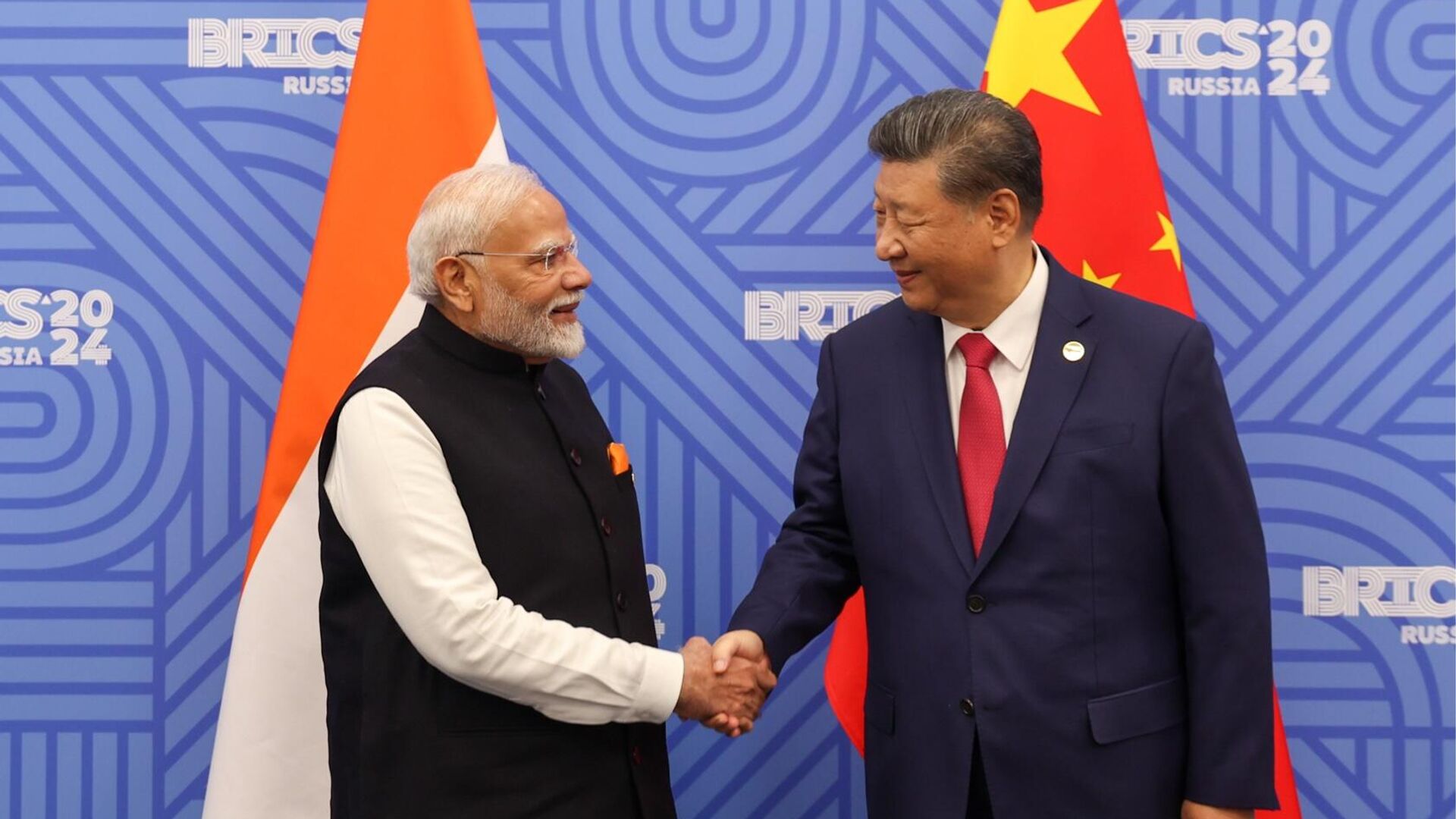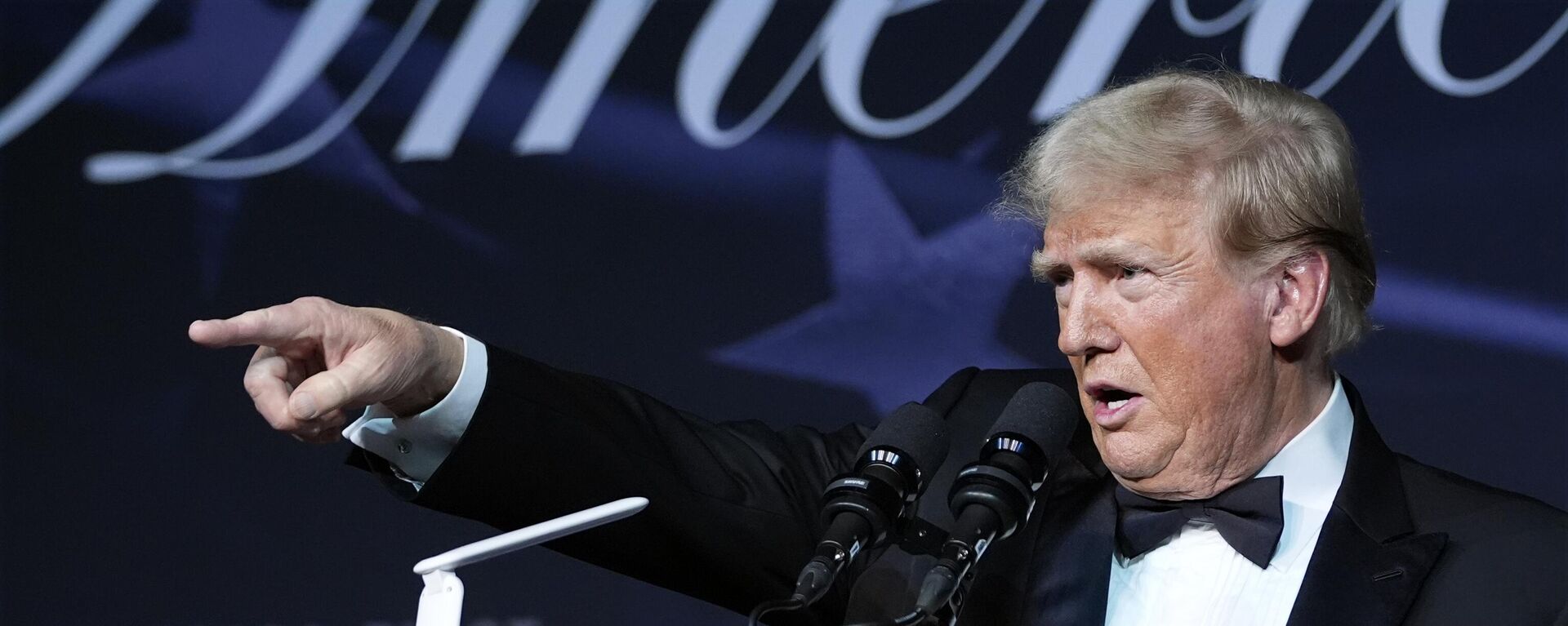Trump's Tariffs: What to Expect from China's Olive Branch to India

© Photo : X/@narendramodi
Subscribe
China has offered to join hands with India to counter the reciprocal tariff announcement by US President Donald Trump, which took effect from Wednesday.
Yu Jing, the spokesperson of the Chinese Embassy in India, said that India and China, being the world's two biggest developing economies, should "stand together" to counter the US President Donald Trump's unilateral tariff announcement on around 90 countries.
"China-India economic and trade relationship is based on mutual benefits. Facing the US abuse of tariffs, which deprives countries, especially in the Global South, of their right to development, the largest developing countries should stand together," Yu wrote on X.
Chinese Foreign Ministry spokesperson Lin Jian said that Beijing would deploy "resolute and forceful" countermeasures in response to Trump's unilateral tariffs.
Amid slump in global stock markets due to the tariff war, Goldman Sachs predicted that China's economy could be impacted by as much as 2.4 percentage points.
As part of his 'Liberation Day' tariffs which kicked in on Wednesday, Chinese exports to the US face a whopping levy of 104%, the highest among all nations. Meanwhile, India, which has also been criticised by Trump on several occasions, has been slapped with a 26% import duty.
However, later on Wednesday, Trump announced a 90-day pause on import duties on nearly 75 countries barring a 10% across-the-board tariff on all imports. A notable exception to Trump's 90-day tariff moratorium is China, for which the US has further hiked the import duty to 125%.
While China and Canada are the only two countries which have slapped retaliatory tariffs on US imports, India has taken a more cautious approach. Responding to the US tariff announcement, Commerce and Industry Minister Piyush Goyal said on Wednesday that India was already negotiating a bilateral trade agreement (BTA) with the US, while describing the US-China tariff war as a "lifetime opportunity" for Indian exporters.
Reacting to China's gestures towards India, Indian economic experts underscored the point that Chinese exporters viewed India, the world's biggest market, as an attractive alternative after all but being shut out from the US market, which has been Beijing's biggest bilateral trade partner.
"The outcome of the US-China tariff war seems pretty clear. With a 104% tariff on Chinese imports, it appears that the US market is all but shut for Chinese exporters in a number of product lines. The US imported goods worth nearly $440 billion from China in 2024, much less than what it exported to China. So, there are obvious concerns in China," explained Dr. Debashis Chakraborty, a Professor at Indian Institute of Foreign Trade (IIFT).
However, Chakraborty said that China was already India's biggest source of import in a number of product categories, as he noted that India ran a deficit of over $85 billion with China in 2024.
"For instance, we are already importing around 70-80% of our Active Pharmaceutical Ingredients (APIs) from China. So, there isn't much scope for China to increase its exports to India much further than the current levels. At the same time, India has been trying to reduce its trade deficit with China and there are significant concerns about dumping of Chinese products in India, necessitating anti-dumping investigations," the IIFT academic stated.
Further, Chakraborty opined that any further increase in Chinese exports to India could create concerns around balance-of-payment in bilateral trade.
"This is because our imports from China would reduce at a much faster rate than exports. Looking at our exports to China, we see that they are mostly in the intermediate section. Exports of high-value products are relatively less in number. So, it is very difficult for India to increase its exports to China in the short-run, given that China is already grappling with an oversupply problem," he explained.
Chakraborty also said that India wasn't in a position to compete with Chinese manufacturers in the Chinese market.
"If we look at the Make in India initiative, we have targeted around 40 different industries, which include textiles, merchandise, automobiles to name a few. Essentially, these are 20th and 21st century product lines. Whereas China, as part of its Made in China 2025 strategy, is focussing on creating an industrial base targeting 22nd century futuristic technologies, including electric vehicles (EVs), Artificial Intelligence (AI), robotics among others. So, it won't be easy for India at all to gatecrash into the Chinese market," the Indian expert stated.
The sentiment is echoed by Professor Ashwani Mahajan, the co-convenor of influential economic advocacy group Swadeshi Jagran Manch (SJM).
"We need to understand that there won't be many opportunities for our exporters in the Chinese markets. Chinese companies, backed by the government, are producing almost everything and anything. This leaves little room for any foreign player to come and enter the Chinese market," Mahajan told Sputnik India.
He said that the real opportunity for India lies in capturing the markets vacated by Chinese companies in third countries.
"So, we are hoping for more bilateral trading arrangements with developed economies like the EU's and in the US. I believe that India would stand to gain from the tariff war," said Mahajan.
However, he added that these were still early days of the trade war. "But, at the moment, President Trump's tariff policies have set in motion a process of realignments of global trading relationships. We have to wait and watch as to where the equilibrium settles," he commented.
Mahajan said that Beijing would like to defend the World Trade Organisation (WTO) framework which Trump is trying to "dismantle", stating that China has been one of the greatest beneficiaries of the multilateral trading system since the 1980s.
"On the other hand, India has been one of the worst victims of the WTO-based trading system. Agreements like Trade-Related Aspects of Intellectual Property Rights (TRIPS) have caused huge losses to the Indian economy in terms of royalty expenditure, which has surged from less than a billion dollars in the 1980s to over $17 billion at present. These royalties have mostly flown out to the developed western economies. At the same time, India has also been a victim of unfair trade practices of China as well as subsidies offered to Chinese companies, distorting the level-playing field," concluded Mahajan.


